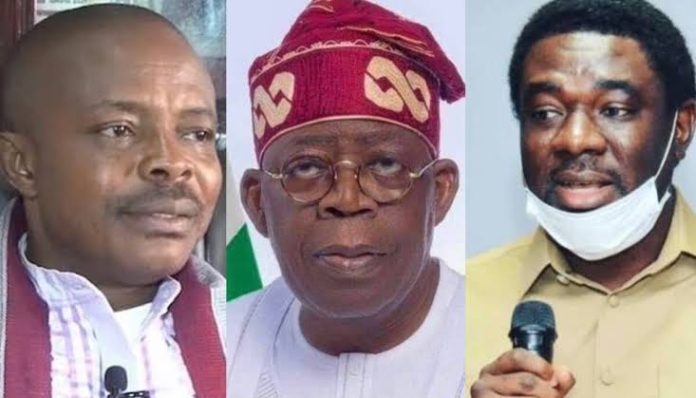BY MUYIWA OYINLOLA
Undoubtedly, the pertinent issue causing face-off between the federal government and Labour today is the issue of upward review of national minimum wage for workers.
It should be noted that what is being negotiated is a national minimum wage, not a Federal Government minimum wage for its workers.
Consequently, a national minimum wage affects states, local governments and private sector employers, especially SMEs and MSMEs. The first consideration in wage negotiation is affordability and ability to pay.
Hence, the issue at stake revolves around whether or not states, local governments and private sector employers can afford to pay.
It also includes its consequences on the economy, inflationary trend and possible layoff of workers if NLC/TUC arm twists government to agree on a minimum wage which the latter insists is not realistic and sustainable.
Whereas there is a general consensus that minimum wage should be increased, the federal government insists that it has to be within a realistic band of what all parties can pay. This perhaps is why the private sector and government are offering ₦62,000.
However, after going forth and back in the last two months, at the last meeting held on Friday, June 7, 2024, the two sides, labour and the government, failed to reach an agreement. While labour dropped again its demand from ₦494,000 to ₦250,000, the government added ₦2,000 to its initial ₦60,000 and offered workers ₦62,000.
This followed the submission
of government’s new proposal
by the minister of finance and coordinating minister of the economy, Wale Edun, earlier in the month.
In his submission, he listed options and projected cost implications to President Bola Tinubu.
Governor Hope Uzodimma of Imo State, who briefed journalists after the submission of the proposal in Abuja, said though no agreement was reached, the committee would forward the two proposals to President Bola Tinubu for necessary action.
President of the Trade Union Congress, TUC, Festus Osifo, who spoke on behalf of the organised labour, confirmed the development, adding that the government must consider the plight of workers and the cost of living.
“As we are now, the organised private sector and the government side have recommended ₦62,000 as the minimum wage, but for us in labour, we feel that with the current economic hardship and difficulties in the land, ₦250,000 would be appropriate as the minimum wage.”
“We will forward this position to Mr President. This committee is to make recommendations to the president, who will then make a recommendation to the National Assembly. We will keep pushing to ensure that we have a wage that can stand the test of time in Nigeria,” Mr Osifo said.
Aljazirah NIGERIA recalls that
the Tripartite Committee on National Minimum Wage had earlier urged the organised labour to have a rethink on the N250,000 it is demanding as minimum monthly salary for workers.
Chairman of the committee, Alhaji Bukar Goni Aji, had urged labour to reconsider its stance based on economic considerations and non-monetary incentives which the Federal Government had so far provided for workers.
He listed such incentives to include the ₦35,000 wage award for all treasury-paid federal workers, ₦100 billion for the procurement of gas-fuelled busses and conversion to gas kits.
Others include the ₦125 billion conditional grant, financial inclusion to small and medium scale enterprises and the ₦25,000 each to be shared to 15 million households for three months, according to him.
He also cited the ₦185 billion palliatives loans to states to cushion the effects of fuel subsidy removal and the ₦200 billion to support the cultivation of hectares of land to boost food production.
He said that there was another ₦75 billion to strengthen the manufacturing sector and ₦1 trillion for student loans for higher education.
He explained the release of 42,000 metric tonnes of grains from strategic reserves and the purchase and onward distribution of 60,000 metric tonnes of rice to the millers association.
Goni stated that the recent salary increase of 25 per cent and 35 per cent on all consolidated salary structures for federal workers and the 90 per cent subsidy on health costs for federal civil servants registered on the health insurance programme.
All these, he said should be considered by the labour unions and accept the ₦62,000 being offered by the Federal Government.
He said that the light rail commissioned in Abuja to relieve transportation costs until the end of the year was a landmark achievement that would cushion the effect of fuel subsidy.
He said in addition to the freedom of civil servants to engage in agriculture, the Federal Government has approved the inclusion of ICT services for alternate sources of income.
He said the committee agreed that where major and small businesses were closing down with the consequent loss of jobs, the outcome of a new minimum wage should be such that it would not trigger further massive job losses.
He further said that linking the strike to electricity hikes with the wage determination was not fair to the negotiating parties.
Labour, in its agitation harps on increasing inflammationary rate, and wastage in the government circle, citing the huge and unmerited salaries of members of national assembly and those in the executive arm.
Pundits argue that even if one kobo is not stolen and National Assembly is scrapped today and President/Ministers/Governors/Commissioners trek to work, States and Local Governments can not afford to pay anything above 60k per month.
Invariably, States and Local Governments will spend all their FAAC/IGR and even borrow to pay their workers who are less than 1% of their population.
They argue that nothing would be left to be spent on education, good roads, healthcare, security and others should government concede to the ₦250, 000 monthly wage demand by Labour.





